Proverb of the day.
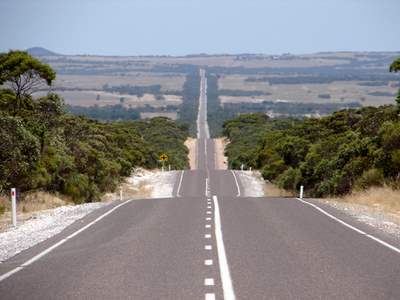
If one wants to go quickly,
one must go alone;
If one wants to go far,
one must go together;
The thing is.. I need to go far quickly..
(Thanks Temmy!) - Picture courtesy Kajaye on Panoramio Read the full post...
Life as a serial expat, addicted traveller, desperate adventurer, wannabe sailor and passionate aidworker

If one wants to go quickly,
one must go alone;
If one wants to go far,
one must go together;
The thing is.. I need to go far quickly..
They ask "So what do you do for a living?", cocktail drink in hand. When I answer "I am an aid worker", there are two kinds of people: Those that roll their eyes and those that say "Really?".
For the first, I don't do an effort to go any further. Either they are not interested or it goes beyond their level of imagination.
For those that look me in the eye, I know I will have a hard time to explain what exactly I do. And why.
Over the years, luckily many people has asked me why I do the work I do, far fewer have rolled their eyes.. So what do I answer?
Well, let me tell you a story. Quite a time-appropriate story actually, as it is related to events that happened exactly ten years ago, in the Balkans.
It is a slightly reworked version of the shortstory "Scene of War", published in my eBook.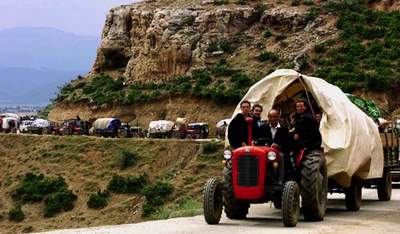
June 1999.
Richard, Alf and I are standing on a mountain pass, at the border crossing between Albania and Kosovo. The view is breathtaking. It is part of a movie, projected in 360 degrees around us. Better than a movie.
A long, slow moving stream starts from far behind us. We can hear it, the random noise. It passes right next to where we stand, and follows bends and curves for as far as we can see. A stream, a steady flow. A stream not of water, but of people. Tens of thousands. Refugees returning home. Whole families on tractors and donkey pulled carts, with all their belongings stacked as high as they can. Mattresses, cupboards, tables, chairs, cardboard boxes… Mothers holding on to babies, brothers and sisters walking hand in hand. Elderly men with deep grooves in their faces, walking with a stick in their hand, or pushing a wheel barrel.
A stream not of water, but of people. Tens of thousands. Refugees returning home. Whole families on tractors and donkey pulled carts, with all their belongings stacked as high as they can. Mattresses, cupboards, tables, chairs, cardboard boxes… Mothers holding on to babies, brothers and sisters walking hand in hand. Elderly men with deep grooves in their faces, walking with a stick in their hand, or pushing a wheel barrel.
A massive flow of people. Each with their own horror story to tell, moving steadily back to their homes. Homes they fled a couple of months ago after militia and special forces wrecked their lives, burnt their crops, raped their mothers and daughters, killed their brothers, sons and fathers. As the stream of people tops the mountain pass, they see the same scenery as I do. I wonder what goes on inside them.
In between the mountains tops, capped with tree forests, scarred by cluster bombs which Nato blanketed over them, lay the valleys. Valleys with a fresh green colour of spring grass and young leaves on the trees. For as far as the eye reaches, we can see plumes of smoke coming from the valleys, like candles on a cake, which have just been blown out. Plumes of smoke, going up in the air and dissolving into the clear blue spring sky. Smoke of houses, cars and farm sheds burning, for as far as we can see, dotted over the valleys. The militia and break away paramilitary forces looted and burned everything as they retreated. It looks like the whole country is still burning. People's lives are burning. And yet the expression on the faces from all who pass us, is not one of desperation, but one of hope. They all smile. Sadly, but they smile. They look at the same scenery as I do, but they think of hope. Hope of starting afresh. They wave at us. They wave at the Nato military trucks and tanks maneuvering in between the stream. "The liberators and the liberated?".
It is yet another scene of war, another scene of misery and hope, another scene of destruction mixed with hope, of a past and a present. Will it ever end? Will we ever learn from our mistakes?
Two F16 fighter jets blast low over our heads. Instinctively, everyone pulls their heads down. The fighting is not over yet. We hear the remote muffled thunder of a bombing raid. Very far away. The misery is not over yet.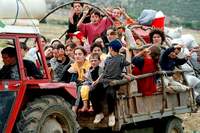 As I get into the WFP car, my eyes cross those of a young girl, sitting on her mum’s lap, on the back of a tractor. She looks at me and I look at her. I smile and she smiles back, hesitantly raising her arm to wave to me. Her mum searches who the girl is waving to. She finds me. She whispers something in the girl’s ears. The girl looks up, kisses her mum on the cheek, and looks back at me. She throws a kiss at me. I throw one back and wave. She laughs. Her dad, driving the tractor looks back and waves at me too.
As I get into the WFP car, my eyes cross those of a young girl, sitting on her mum’s lap, on the back of a tractor. She looks at me and I look at her. I smile and she smiles back, hesitantly raising her arm to wave to me. Her mum searches who the girl is waving to. She finds me. She whispers something in the girl’s ears. The girl looks up, kisses her mum on the cheek, and looks back at me. She throws a kiss at me. I throw one back and wave. She laughs. Her dad, driving the tractor looks back and waves at me too.
Would they know I am thinking of my daughters? Would they know she has the same eyes, the same hair. Would they know this is why I do this work? Because she could have been one of my daughters, sitting on my wife’s lap?
This could have been my family, my life. But destiny has put them there and me here. Sheer luck determined those who suffer and those who never realize enough how lucky they are. Sheer destiny determined those who need help and those that can help. I can help.
And that is why I am an aid worker.
Pictures courtesy Arben Celi (Reuters), Getty Images and Tom Haskell (WFP)
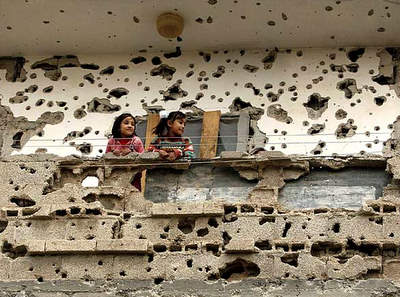
Palestinian girls look out from the balcony of their house in Rafah in the southern Gaza Strip.
More Pictures of the Day on The Road
Picture courtesy Ibraheem Abu Mustafa/Reuters

Don't forget: today, we're all standing up for the cause of the Earth. The world’s first global election, choosing between Earth and global warming.
Earth Hour invites all of us to switch off our lights today March 28 between 8:30-9:30pm (local time) in a sign of support. I set my alarm clock. Don't want to miss it. I want to be one of the 1,000,000,000 people who will vote for Earth.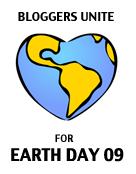 Not that it will save much energy, or will have the Earth live one hour longer. But as a call to have people think about the global warming. About the environment.
Not that it will save much energy, or will have the Earth live one hour longer. But as a call to have people think about the global warming. About the environment.
Earth Hour. A simple gesture. An important cause. I should have gone into advertising. Join us. On Earth Hour that is. Not in advertising.
Check out:
- The Earth Hour's photo stream on Flickr as they are being posted.
- Their Twitter updates
- The YouTube Earth Hour channel
- Plenty of Twitter posts about Earth Hour. (at the time US East Coast went into Earth Hour's time zone, tweets came in at 30 per second!)
Update: 20:30 - and off went the lights at The Road.
This post is published as part of the Bloggers Unite, a viral movement of bloggers for a cause.
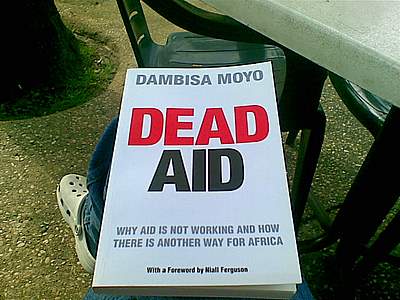
This post is somehow a follow-up on my early thoughts in The shrinking digital divide and other aid fairy tales.
I have been reading in "Dead Aid" by Dambisa Moyo, a book I have mentioned before.
First a common misunderstanding about this book: Moyo distinguishes three forms of aid:
- humanitarian aid, in the form of assistance in natural or man made disasters;
- charity aid, in the form of mostly smaller, localized and targeted assistance; and
- government aid.
In her book, she is only attacking "government aid", not the other two. Many misunderstood this.
I support her thoughts on the ineffectiveness of government aid even though it would be truly worth while to write a sequel to this book to also put the effectiveness of humanitarian aid and charity aid under the magnifying glass, but that is for another post.
Now, one of the points she makes is that in the past, aid to African governments (but I would generalize that to "any government") had political goals. She specifically mentions how aid was targeted to stop the hail of communism by the freshly independent African states in the 60ies and 70ies. And how the West poured aid money over any government as a form of financial assistance in exchange for their loyalty to the one and only true belief: Western Capitalism.
Little did the West care about the human rights abuses, the corruption or (God forgive) the inappropriate use of aid by the African governments. This grew to an institutionalized support of corrupt and often cruel dictators, for as long as they sang the song of the West, and not that of Moscow.
The fact that we also got cheap oil and minerals in exchange was definitively a good bonus. And the fact they were a good market for many of our cheap products (including Pepsi-Cola and Coca-Cola) and arms made us all sugar-happy. Hey, the other -Red- side did exactly the same too. Little did Moscow care how aid was used.
But this also made many African states aid dependent.
In my view, this is quite correct. And it was not only the anti-communist aid flavour which is worth to be mentioned, but we also clearly saw and still see an "anti-muslim aid flow" trying the stop the advances Islam made southwards through Africa.
Draw a horizontal line just north of the equator and you more or less have drawn the line between Muslim and Christian Africa. Check out those states on the border line. And see which have been able to count on the political, military and financial support from the West. South Sudan, Kenya, DRC, Uganda, CAR... (True the line goes a bit further North in the West). Interesting, no? So were all the secret US arms shipments stacked on Moyo Kenyatta airport in Nairobi and Entebbe airport in Uganda. And the tons of unlabeled cargo planes with registration numbers starting with "N". (which country has plane registrations starting with "N" again? Hmmmm.. the US, right?)
I always had -idealist as I am - an issue with the "politization" of aid. I have felt this first hand in Afghanistan and Iraq after both countries were invaded by the alliance of the willing (and their puppy dogs). As a humanitarian aid worker, not only did my conscience struggle, but I have seen the first hand consequences where the affiliation of aid agencies with 'occupying' powers made the former a target for hostilities. Many of us have died because of this alliance.
And what stopped us? Well.. we were not going to bite the hand that fed us, were we? Why would we, aid agencies and aid workers bite the hand of donors? Who are we to question the intentions of those who give us money? In the end, we are helping the poor, curing the sick, sheltering the homeless and feeding the starving masses, no? Would we question that many of these are caused by the same fraud political systems who donated us the money?
Yes, of course we realize that not everything was kosher, but shhht.. this is a well hidden secret, and not something to be talked about. The hand that feeds us, you know!
Now here is another thought: the same goes for the countries we work in. How much are we willing to compromise our conscience and work with corrupt and sometimes completely abusive or repressive governments because if we upset them, we 'might just as well be thrown out of the country'?
Asking the wrong questions is often already enough. Protesting loud enough for aid cargoes stuck at airports is enough reason to PNG. Pointing to corruption and syphoning off aid funds and goods is always a winner to get thrown out. That would not help the poor, we reason.
I am not cynical, I am realistic. We *have* to make compromises. We do have to close our eyes, bite our lip, and sit on our hands sometimes. But up to what point? Up to what point is this still ethical? As of what point are we becoming part of a corrupt system ourselves? We, the do-good-ers. We, the world changers. We, who mean well.
Sometimes the road to hell is paved with good intentions.
Alertnet just published two excellent articles by Jan Kellett on this subject. Further food for thought: "Darfur: A humanitarian compromise too far?" Part 1 and Part 2. Enjoy!
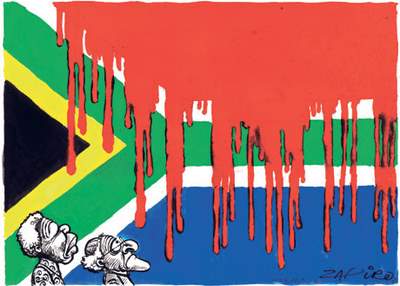
In a previous post, we talked about the economic powers China is deploying in Africa. But with that comes also the expansion of its political power.
Some of it has well known. The best example is China's documented circumvention of the UN Security council's arms embargo against Sudan on one hand, and on the other hand Big Red's veto power leashing the Council's ability to lash out against Sudan.
But this week, it went a little more undercover. Earlier this week, the South African government denied issuing the Dalai Lama a visa to attend a peace conference. As a result several other key figures pulled back in a sign of protest, and in the end the whole conference was cancelled.
Today, the South African government admitted it decided to bar the Dalai Lama from attending, to avoid undermining relations with China.
A cabinet statement said that while South Africa had not acted on a specific demand from Beijing, it was not prepared to "jeopardise" ties nor allow itself to be used as a political platform in the run-up to the hosting of next year's football World Cup. (Full)
Picture courtsey From Sandton to Shanghai
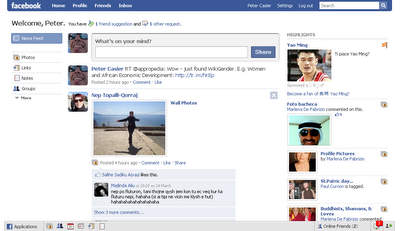
One needs to have an account on Facebook if you want to look at any postings any user makes. No wonder Facebook has billions and billions and billions of so-called users. (Statistics, ah!). So after I joined two years ago, and kept my foot tracks well covered, I am coming out (so to speak): My Facebook profile is now public.
Well, I already had 4 "friends" before I made my profile public. And I had not even used my real name.
But now you can be-friend me as if there were no tomorrow. Write on my wall like it was yours. Spam me with your applications and videos. Do it! Do it! ;-)))
So, just as I use Twitter, I want to play with what it can do and what it can't, as a social site, creating a community. Even if it was just to experiment. And I don't like it. The user interface sucks. They made it an art turning something simple into something utterly complex. Is there a science in making software cumbersome for mere mortals? Is this what Computer Science PhDs make these days?
And I don't like it. The user interface sucks. They made it an art turning something simple into something utterly complex. Is there a science in making software cumbersome for mere mortals? Is this what Computer Science PhDs make these days?
Apparently they just had a facelift (I never used the old 'Facebook' so can't compare), and no wonder 94% of the Facebook users don't like it.
I get utterly confused as what Facebook aims to be. A Twitter with pictures, and links? With some applications you can link into, as a sort of 'my webpage'. An iGoogle for non-techies? But why then, why do they have to make it so complicated?
I know posts of my blog are automatically imported to my Facebook, but - heaven is my witness - I can't find back where they put it.
I know I can put links in something they very significantly call 'my wall' (like I write on my wall at home, rrright), but why, then, why don't they let me edit the text that comes with the link?
I know Lydia wrote on my wall-to-wall (I got an email saying she did so), but I swear, I can't find it. And what a weird name "wall-to-wall". No wonder I feel claustrophobic each time I go onto Facebook.
I once got on a wall-to-wall with Sophie in China and wrote something on it, but no way to trace it back.
Every time I click on this or that, it asks for authorization to access my profile this and my approval for thing that and disclaimer of the other. Phew. It looks like I am signing my life away each time I click on something.
If people had to pay for Facebook, they would be left with a dozen users, I guess.
It smells like Microsoft a couple of years ago: people used it because it was the least painful of all evils. And just like Microsoft looses market bit by bit (look at the bad press Explorer is getting versus Chrome and Firefox), Facebook has only one way to do: Down baby...
Facebook? Beeeeh.
This video gives an excellent snapshot of the economic development in Angola, a country I have not been to since 1995, and its business with China.
Angola, just like DRC, is one of Africa's mineral richest countries, so no wonder there is quite an interest for its natural resources, only to be challenged by logistical nightmares.
There is a lot to be said about the deals China makes all over the world, securing oil, buying or leasing agricultural land and concluding massive hybrid aid/business contracts. Just today, I stumbled upon the following two press articles:
From the Chinese Press Agency:
China provides US$600,000 of humanitarian aid to DR Congo.
From Reuters:
Congo to push forward with $9 bln Chinese mining contract.
Says enough, I think. Two views, two perspectives, two sides to probably the same story. As government to government aid has clearly failed in the past decennia (read 'Dead Aid'), maybe the business deals are the only true form of development for Africa.
If only the economic profits would also benefit the less fortunate in Africa.
Video discovered via Time of the Leopards
Greenpeace first released their 'Guide to Greener Electronics' in August 2006 and it was recently updated. The guide ranks the 18 top manufacturers of personal computers, mobile phones, TV's and games consoles according to their policies on toxic chemicals, recycling and climate change.
Nokia, Sony/Ericsson, Samsung and Toshiba ended on the green top, leaving Nintendo and Microsoft dangling at the lower end of the 'Green Scale'. (Full)
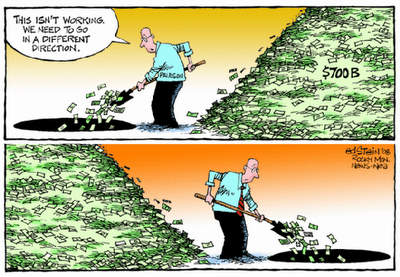
The New York Times published an interesting overview of the programs the US government is financing to support the struggling economy.
Beyond the $700 billion bailout known as TARP, which has been used to prop up banks and car companies, the government has made commitments of $9.9 trillion. $9.9 t-r-i-l-l-i-o-n. (If you want to have an idea what one trillion dollars looks like, check here this post).
- The Government as Investor: $5.4 trillion
Includes direct investments in financial institutions, purchases of high-grade corporate debt and purchases of mortgage-backed securities issued by Fannie Mae, Freddie Mac and Ginnie Mae.- The Government as Lender: $2.3 trillion
A significant expansion of the government's traditional overnight lending to banks, including extending terms to as many as 90 days and allowing borrowing by other financial institutions.- The Government as Insurer: $2.1 trillion
Includes insuring debt issued by financial institutions and guaranteeing poorly performing assets owned by banks and Fannie Mae and Freddie Mac.(Full)
 I am active on several social bookmarking sites, and one of them is Mixx.
I am active on several social bookmarking sites, and one of them is Mixx.
Today, something went wrong with their site and the users' thumbnail pictures all got mixed up, it seems.
Right now, according to them, this is how I look. Mmmm, I llllike it a llllot! Go Mixx, Go!
Update: Too late-- the problem seems to be resolved.. Ah. Thank you all for the 249 'Friend' invites in the last hour. I was a bomb on Mixx today. Just a clarification: I am 49 and male.
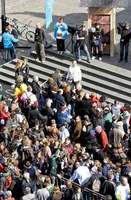 I hope not many people really "had to go urgently", but on the occasion of World Water Day, UNICEF, the UN's Child's Fund, got 756 people lined up to a latrine in central Brussels to raise awareness for the need for clean water on World Water Day. (Full)
I hope not many people really "had to go urgently", but on the occasion of World Water Day, UNICEF, the UN's Child's Fund, got 756 people lined up to a latrine in central Brussels to raise awareness for the need for clean water on World Water Day. (Full)
The 2009, the theme for World Water Day is "Shared Water - Shared Opportunities", with a focus on transboundary waters.
Many claim the global water crisis is one of the causes of the global food crisis. And soon will become the scarcest natural resource. (Full)
Interested? Here is some background reading on the importance of water hygiene, sanitation and the right to access to clean water. (Thanks Simon!)
More on The Road about water
Picture courtesy Belga
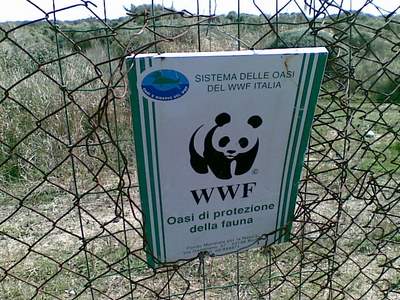
Close to where I live, here in Italy, is the "Oasis Macchiagrande", a WWF (World Wide Fund For Nature) nature reserve which, according to the Italian WWF website features "an interesting combination of Mediterranean scrub behind a Mediterranean forest, making it the most beautiful and best preserved coast of Lazio."
Well, it surely is an interesting "combination of things", plastics mainly. I am not so sure if it is the "most beautiful" and "best preserved" piece of coast line I have ever seen though, when looking at these pictures I took today: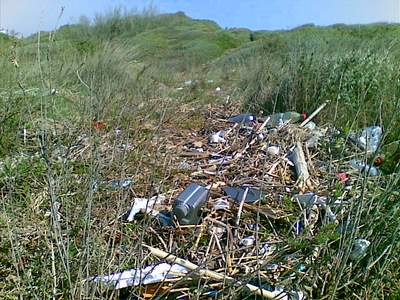
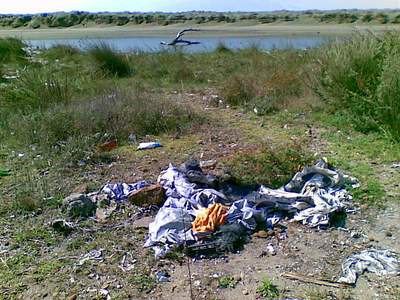
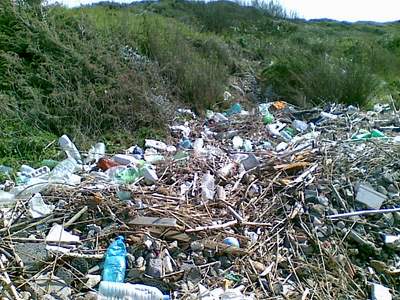
I also doubt if the site is an illustration of WWF's mission statement, "to stop the degradation of the planet's natural environment and to build a future in which humans live in harmony with nature"...
Shame!
Spring is all around us, here in Italy. Some random snapshots taken during a walk this morning.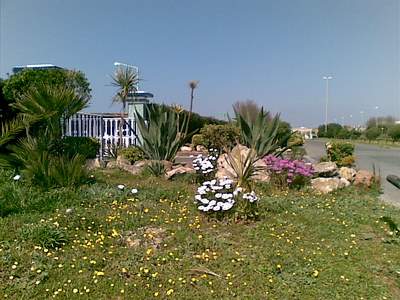


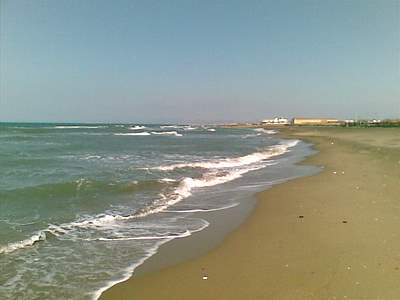
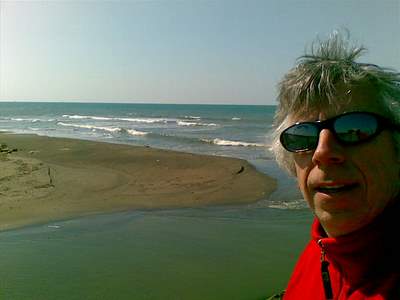
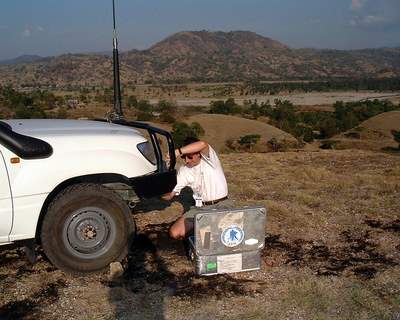
If you want a glimpse of what goes on in the heart and mind of aid workers, this article written by an MSF colleague and published in The Globe and Mail, gives an insight:
Imagine in your home country a collapse of all systems and structures of authority and governance. Imagine violence chasing you and your family out of your homes to walk 100 kilometres to a safer, but desolate area. Imagine carrying some clothes, some food and a cooking pot. Imagine food running out. Imagine drinking water from a dirty river. Imagine children dying from diarrhea. Imagine simple infections leading to amputations or death. Imagine women dying in childbirth. Imagine that all of this is happening while people with the power to do something hold meetings and decide not to intervene.
People shouldn't die from the lack of a 50-cent medication or vaccine. People shouldn't die from the lack of clean water or soap. People shouldn't die from the lack of a proper shelter. But they do.
Over the years, I have seen that a medical and logistics team of just five people supplied with basic medicines, and materials can save the lives of thousands of people. (Full)

His Holiness is at it again. On his tour to Africa, he stated Aids " cannot be overcome through the distribution of condoms, which even aggravates the problems." (Full)
Health workers beg to differ with the pontiff.
The UN rather explicitely rebroadcasted their stand: "Condom use is a critical element in a comprehensive, effective and sustainable approach to HIV prevention and treatment. Prevention is the mainstay of the response to AIDS. Condoms are an integral and essential part of comprehensive prevention and care programmes, and their promotion must be accelerated."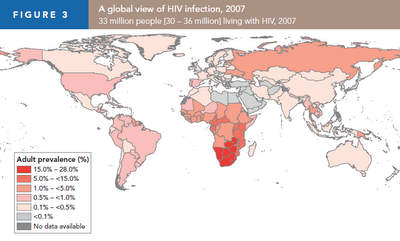
Sub-Saharan Africa is the world's most heavily affected by HIV, accounting for 67% of all people living with HIV and for 72% of AIDS deaths in 2007.
Update: AVAAZ is running an online petition asking the pope to exercise due care in his leadership on this issue. (Thanks Becks - who runs this health project in Madagascar!)
Map and statistics from the latest UNAIDS report on the AIDS epidemic.
Snapped this morning just as I was leaving home, on the way to work. Originally posted on my Twitter account.
Can't say how many times I watched this, but I never get tired of it.
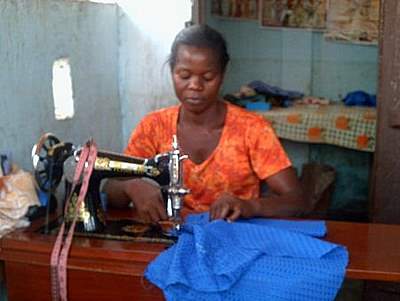
Yiepee! We're now totalling US$5,850 on our social project.
We just got $500 refunded from previous loans and reallocated them to new microfinance loans for Kiva entrepreneurs:
- Hilda Bermejo in Peru (Party Supplies): $50
- Yawa Ameganvi in Togo (Sewing machine): $50
- Paulina in Peru (Food stocks): $50
- Evangelista Carranza in Nicaragua (supply tocks): $50
- Shabana Zafar women in Pakistan (Supply stocks): $100
- Uzma khanum women in Pakistan (Tailoring): $100
- Irshad Bashir women in Pakistan (Bakery stocks): $100
Follow the progress on our scorecard!
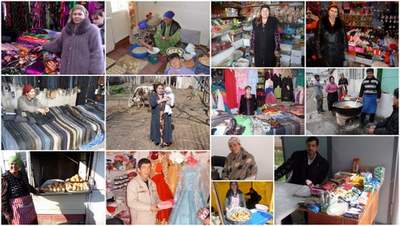
Many of you will know of "Change Starts Here", The Road's social project, funding microfinance loans via Kiva. our scorecard lists all loans, for a total of over $5,000 so far.
Tamara commented on a previous post that Kiva offers core volunteer programs, which might interest readers from The Road:
• Kiva Fellows Program: Individuals spend 10 weeks to one year with a microfinance institution in a developing country, chronicling the lives of the working poor and assisting the microfinance institutions to maximize their relationship with Kiva.
• Kiva Translation Program: Volunteering from their own homes, individuals take entrepreneurs’ loan profiles written in the local language and translate them to English. The profiles are then posted for lending on Kiva.org. Kiva Translators help bring the entrepreneurs’ stories to life for potential lenders.
Languages needed include: Bahasa Indonesia, French, Mongolian, Portuguese, Russian, Spanish and Vietnamese.
Check out other Kiva Volunteering possibilities.
Picture courtesy Kiva
Today, Thomas, TJK was posthumously awarded the "Tun Myat Award for Excellence in Humanitarian Logistics".
Thomas was "one of us". An true humanitarian, an aidworker, colleague, friend and mentor who passed away after a sudden illness end last year.
Video thanks to Ekram Elhuni, Riccardo di Cola and Marco Frattini.
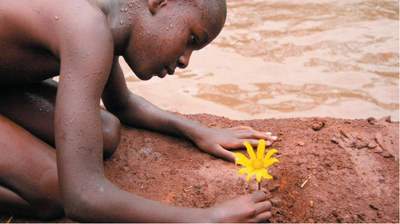
Eric, a reader of The Road, forwarded me a bunch of new aidworkers blogs from all over the world. I added them to the list on the side column:
Aidworker (Senegal)
All Quiet on the Quaker Front (Burundi)
Around Here Somewhere (Malawi)
Cashew Man (Canada/Ethiopia)
Change Around the World (Ghana)
Deep South Sudan
Ending Extreme Poverty (DRC)
The Faders in Sudan
From Congo (DRC)
Head Down Eyes Open (Geneva)
Humanitarian Relief (World)
A Humourless Lot (World)
Mangham Mayhem (Mongolia)
Nic Dominguez (Kenya)
Notes on Development (Ghana)
Our Man in Cameroon
Project Kadutu (DRC)
Where in the World? (Malawi)
Remember: if you have not time to read them all, check their latest posts on my AidBlogs site, where updates are automatically aggregated.
Picture courtesy Julius Mwelu/Irin, via A Humourless Lot
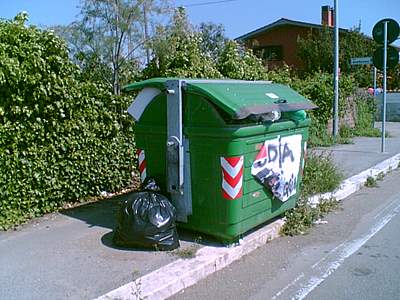
While I love living in Italy, one of the things that intrigued and bothered me is the lax attitude versus waste management, recycling and garbage collection.
Sure enough, there are many "parts" in Italy, each with their own habits, procedures, administration, and culture, so I can not speak for the parts I have not lived in, or travelled through, but it seems in many parts the garbage collection is done in the same way: People dump their waste in garbage skips scattered along the streets, both in town centers and along the roads in rural areas. A garbage truck comes along every so often to empty the skips.
There seems to be no limit as to what people can dump in these skips. You can find anything from normal household garbage, the contents of entire file cabinets, chemicals like paint, engine oil and cleaning products, leaves and branches from the garden, bicycles, fridges, microwaves and computer screens. Just about anything goes. And if it is too big to put inside, people just leave it next to the skip. Often these collection points, separated by only a few hundred meters in the towns, become a concentric area of scattered broken glass, plastic bags, tins and cans that were either spilled while throwing them in the skip, pulled out by street dogs, or just dumped on the spot, next to the skip.
Often these collection points, separated by only a few hundred meters in the towns, become a concentric area of scattered broken glass, plastic bags, tins and cans that were either spilled while throwing them in the skip, pulled out by street dogs, or just dumped on the spot, next to the skip.
There are mainly three types of skips: one for generic waste, one for paper and cardboard and one for plastic and glass. In many cases, though, you can only find the one for generic waste, so "recycling" is often only a remote thought in Italy. A thought confirmed if you look what people actually dump in the recycling bins. It seems like they are used as an overflow for the general waste skip.
Most of the time, the skips are not emptied fast enough. What is the "well-intended waste generator" to do? He or she put his stinking and leaking garbage bags in the car (guaranteed to leave a smell for the next two months) early in the morning (what else do you need to start off a nice day), drives to the skip only to find it full... Of course people will not drive to the next one, or come back the next day. They will dump it right there.
I was glad to finally see some recycling bins in my neighbourhood. Previously I had to drive 3 km to the nearest place where I could conscientiously dump carefully separated paper, plastic and glass.
Unhappy I was to find the "glass and plastic"-skip is never emptied. It just stands there, full. And has been for the past four months..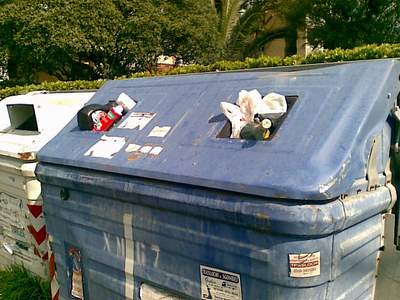
More on The Road about living in Italy.
A YouTube children’s song about "a grass-mud horse" has drawn nearly 1.4 million viewers. A "grass-mud horse" cartoon has logged a quarter million more views. A nature documentary on its habits attracted 180,000 more. Stores are selling "grass-mud horse" dolls. Chinese intellectuals are writing treatises on the "grass-mud horse’s" social importance. The story of the "grass-mud horse’s" struggle against the evil "river crab" has spread far and wide across the Chinese online community.
Why?
Well "The Grass-Mud Horse" is a mythical creature whose name in Chinese sounds like "f*** your mother". Its relative "the invading river crabs" sounds like "harmony", which in China's cyberspace has become a synonym for censorship.
 The 21 super deluxe espresso machines, costing several thousands of dollars each, at the EU headquarters in Brussels broke in less than a year. It was a mystery which resulted in a legal action against the supplier of the machines.
The 21 super deluxe espresso machines, costing several thousands of dollars each, at the EU headquarters in Brussels broke in less than a year. It was a mystery which resulted in a legal action against the supplier of the machines.
A settlement has now been reached: The machines will be replaced, and the staff will be properly trained on how to properly brew an espresso, a latte, and a macchiato.
While there is still a debate whether the quality of the Brussels' water is good enough to brew a decent cup, the coffee emergency has officially be declared as "over". The coffee alert level went back to "green". (Full)
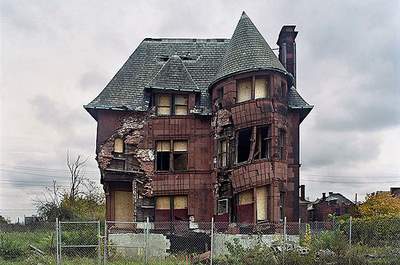
The William Livingstone House in Detroit, constructed in 1893 in the once-elegant Brush Park neighborhood.
Time Magazine published a powerful photo series about urban decline in Detroit.
"Ruins are the visible symbols and landmarks of our societies and their changes...the volatile result of the change of eras and the fall of empires. This fragility leads us to watch them one very last time: to be dismayed, or to admire, it makes us wonder about the permanence of things."
More Pictures of the Day on The Road.
Picture courtesy by Yves Marchand and Romain Meffre.
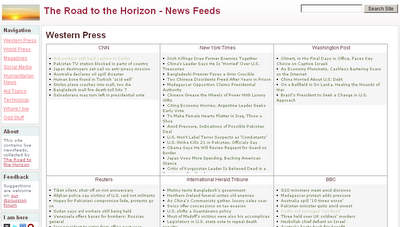
There was a technical glitch last night with either Google Sites or Google Gadgets (or both), which caused my news feeds site not to load properly. Most feeds came up with an error "Not a properly formatted file missing xml header".
I thought the problem was solved, but Mark from Living Prepared reported to still see the problem. So this is how the site should NOT look like: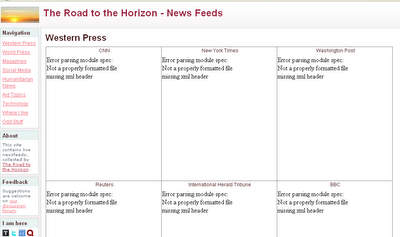
I checked this morning in Firefox, Internet Explorer, Chrome, Safari and Opera, and all seems to work.
Can you please verify if you can load the site ok, and comment on this post, or join the discussion on our forum?
Update 1:
Each page on NewFeeds loads dozens of feeds, from different sites. So it is not fast, and from time to time, some of the feeds don't display because the original site has an adhoc problem.
What really concerned me is when anyone sees "Not a properly formatted file missing xml header". That is the problem I am trying to cure...
Update 2:
Thanks to all the Email, Tweets and comments. The problem is now solved!
- Peter
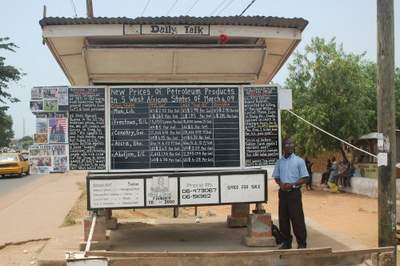
Alfred Sirleaf is an analog blogger. He runs the “Daily News”, a news hut by the side of a major road in the middle of Monrovia. He started it a number of years ago, stating that he wanted to get news into the hands of those who couldn’t afford newspapers, in the language that they could understand.
This picture, I found on Afrigadget, a blog about low tech solutions for every day challenges in Africa. A blog that always gives me hope.
More Pictures of the Day on The Road.
 Over 100 Canadians are facing prosecution for chipping in to buy a plane ticket for a Canadian who has taken refuge inside the Canadian Embassy in Sudan.
Over 100 Canadians are facing prosecution for chipping in to buy a plane ticket for a Canadian who has taken refuge inside the Canadian Embassy in Sudan.
Abousfian Abdelrazik is a Canadian citizen from Sudanese descent, visiting his mother in Sudan when he was arrested for alleged terror ties. He claims to have been tortured, but was not charged. He was released from prison because Sudanese investigators found no evidence to support criminal activity.
As he is a Canadian national, he took refuge inside the Canadian Embassy in Sudan, but lacked the funds to pay for his return fair. Over 100 Canadians chipped in for him.
According to Canadian law, these benefactors can be charged, and could spend up to 10 years behind bars, as Abdelrazik is still on a UN terrorist blacklist.
Oh, and he is on the international no-fly list also. (Full).
Go figure.
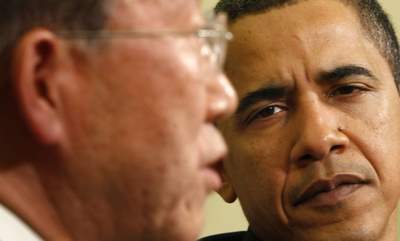
United States' debt to the United Nations exceeded $1.5 billion at the start of 2009. By far, the largest amount of debt is for peacekeeping, over $1.3 billion. These arrears make the United States the largest debtor to the United Nations. (Source)
No wonder the UN's Secretary-General Ban ki-Moon asked the UN's biggest single donor to cough up the greenbacks in his recent speech to Congress, calling the US a "Dead Beat Donor".
Ooops! The US did not think it was funny. (Full)
Miguel d'Escoto Brockmann, the president of the UN's General Assembly, thought US-bashing was fun, and joined the rally by lashing out at the United States over their attitude about Iran and Cuba.
Ooops! The US did not think it was funny. (Full)
I think it is just temporary glitch, you know. Once the US hicks up the dope, the UN will all be happy-happy again, and once more we will have "only one letter of difference" between the UN and the US.
Picture courtesy AP Photo/Gerald Herbert
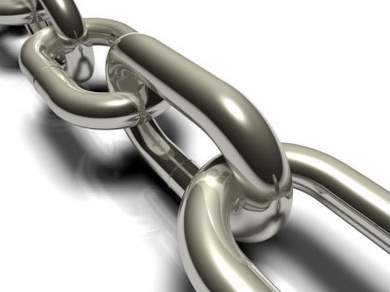
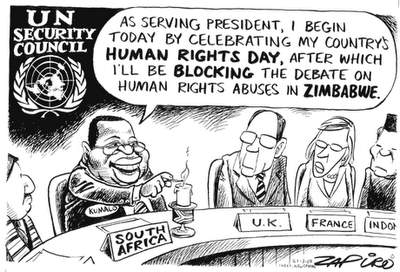
According to a recent poll by Harris Interactive, amongst the 7,000 people surveyed, the majority believes the "United Nations Does More Good Than Harm".
But many confess they don't really know all that much about the UN. Just one-quarter of Germans (25%) and French adults (28%) say they are familiar compared to a plurality of British adults (40%), half of Spaniards (48%), a majority of Italians (55%) and almost two-thirds of Americans (64%).
People in these six countries all believe that the UN does good work. Three–quarters of French adults (75%), two-thirds of Italians (69%), Germans (67%) and Britons (65%) and at least three in five Spaniards (63%) and Americans (60%) all say the UN does more good than harm. (Full)
[Ed: The cynic in me would say: "Are the ones who believe the UN does more good than harm, the same that don't know the UN?". Seriously, the survey has some good data. Read it!]
Cartoon courtesy SpainVia
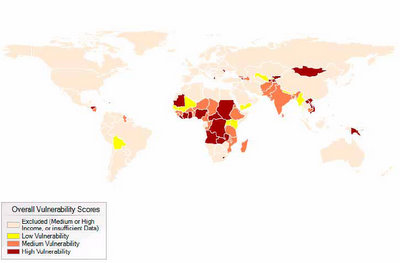
According to the IMF (International Monetary Fund), the global financial crisis will significantly worsen the budgetary position of many Low Income Countries (LIC) governments up to the level where they will need international aid to be able to survive the crisis.
Why are LIC countries particularly vulnerable? Because they don't have a buffer more developed countries have...
On one hand, government revenues are expected to suffer as economic activity slows and commodity prices fall. Potential declines in donor support and tighter financing conditions will likely impose further pressures on their budgets.
On the other hand, many countries will need to increase spending to protect the poor, and additional spending pressures may arise from currency depreciation and rising interest rates, which could raise debt service costs.
The most vulnerable countries are: Albania, Angola, Armenia, Burundi, Central African Rep., Congo DRC, Côte d'Ivoire, Djibouti, Ghana, Haiti, Honduras, Kyrgyzstan, Laos, Lesotho, Liberia, Mauritania, Moldova, Mongolia, Nigeria, Papua New Guinea, St. Lucia, St. Vincent & Grenadines, Sudan, Tajikistan, Vietnam and Zambia.
Baseline projections for 2009 foresee a total balance of payments shock of US$165 billion for these countries. They will need at least US$25 billion of financial assistance to offset the impact of the shock on their international reserves. The needs could be much larger — approaching US$140 billion in a “bad case” scenario. (The full IMF report)
With the stimulus package, the US debt and the war in Iraq, we have entered the era of trillion numbers.
Trillion. That is a million times a million. A thousand billion. A one followed by 12 zeros. 1,000,000,000,000,000,000.
So... how does a trillion dollars look like?
Well, in true dimensions, here is a million dollars in $100 dollar bills:
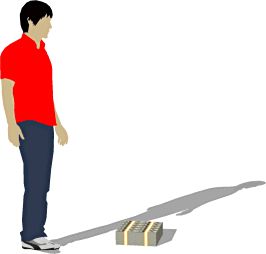

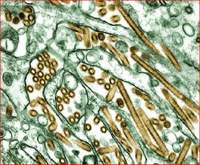 The World Health Organization and the European Centre for Disease Control launched an investigation into how live Avian Bird Flu viruses (both H5N1 and H3N2) were accidentally mixed up with Bird Flu vaccines and shipped to 18 countries.
The World Health Organization and the European Centre for Disease Control launched an investigation into how live Avian Bird Flu viruses (both H5N1 and H3N2) were accidentally mixed up with Bird Flu vaccines and shipped to 18 countries.
US-based Baxter International accidentally sent an “experimental virus material,” which mixed H3N2 seasonal flu viruses and unlabelled H5N1 viruses, to an Austrian research firm. That company then shipped portions of the mixture to sub-contractors in the Czech Republic, Slovenia and Germany.
Czech researchers caught the error in early February when testing the shipment on ferrets. The animals died from the inoculation, indicating a live Bird Flu virus. (Full)
[Ed (cynical): Well that is one way of spreading Avian Flu across the globe: Use DHL!]
Update April 28th:
Seems stupidity and greed know no borders. See this post about Swine Flu...
Update April 29th:
A similar incident: Swine Flu virus samples explode on Swiss train
Update May 1:
How many people die of flu every year? How many died of swine flu?
Picture courtesy CDC Public Health Image Library
Within a while, we won't even remember this temporary economic hiccup anymore. US Congress has found the solution to save the economy with the Pelosi GTxi SS/Rt Sport Edition.
Not only will it beat the pants off any imported car (for the time while importing cars is still legal), it will save the economy, save your wallet, save the environment AND is safe too.
Here is the answer:
More satire on The Road.
Discovered via PreSurfer.
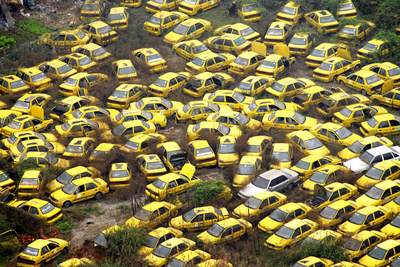
While scanning the news headlines this morning, I came across these:
- International Women's Day: Global: Women hold only 18% of the parliament seats
- The past relived: Northern Ireland: Two British troups killed in attack.
- So-called factual: Sudanese president says aid groups steal 99% of Darfur aid funds
- Dirty: Human Rights Watch recommends an inquiry in the vicious killing of two Kenyan activists
- Symbolic? Truck killing Zimbabwe's prime minister's wife had USAid insignia, was purchased by US and driver was hired by a British development agency
Picture courtesy AFP/Getty Images
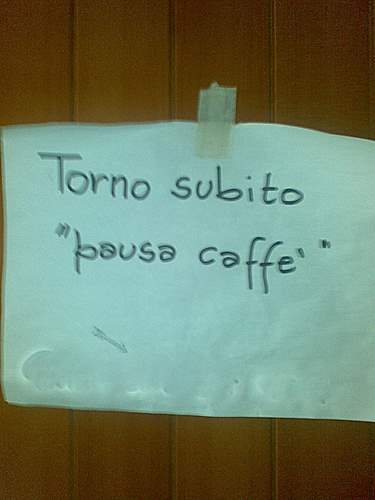 Why I like living in Italy? They got their priorities right!
Why I like living in Italy? They got their priorities right!
We had a business appointment in town this week. Found the office closed with a little note on the door: "On coffee break. Will be right back".
The whole office had gone to the coffee shop on the corner for the morning shot. Business could wait.
And yes, coffee is a big thing in Italy. Check this post.
More on The Road about living in Italy.
Today, March 8th is International Women's Day. While in the past decennia we witnessed a significant change in attitude both in women's and society's opinion about women's equality and emancipation, there are still places in the world where women suffer greatly.
One of those is Eastern DRC where women are systematically raped as a war strategy between warring fractions. Used as a weapon of war, sexual violence and rape exist on a scale seen nowhere else in the world.
Often successful in its intent to destroy and exterminate, rape is causing the destruction of women, their families, and their communities. While Congo’s women are the backbone of their society, efforts to protect women and girls in the Congo are failing spectacularly.
Here is a video from a shelter for women, victims of sexual assault, in Bukavu in DRC.
The video was produced by Raise Hope For Congo, a movement aiming to protect and empower Congolese women and girls. You can help them, and the women of Congo by raising awareness and rolling up your sleeves with a toolkit they provide.
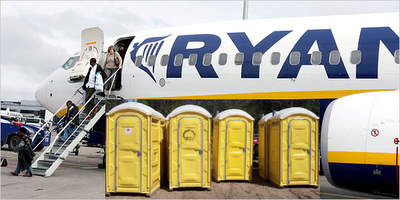
Ryanair wants to make passengers pay for the use of the bathroom on their planes.
Upgrading (or is it downgrading?) their entire fleet of 737-800s with coin-operated toilets is not an option as Ryanair operates heavily in areas using both the euro and British pound. Thus Boeing was requested to design toilets with doors that open only if you swipe a valid credit card through the locking mechanism, according Ryanair chief executive Michael O'Leary. (Full)
Ryanair denied other options included weighing passengers' #1 or/or #2 post-factum (or post-rectum), and charging $10 per kilogram of deposit as passengers would want to exit the loo. Business class passengers were to get a 10% discount.
Discussions about selling diapers tax-free were also off the table, even though mass producer Pampers said it would venture with a major UN agency, donating 10 cents per sold diaper for a good cause. Ryanair said 'filled diapers' weigh too much and weight translates to fuel consumption. They also suspected passengers would simply share the same diaper to save costs, specifically on flights to and from Holland.
BAA (Budget Airlines Association) suggested a 'fart-o-meter', charging passengers per milligram/m3 of gastrointestinal gas concentration as a viable cost recovery option.
The philosophy behind it, is sound: an electric vent would automatically be activated, when the fart-o-meter indicated a 'red alert' state. The passenger in-situ would be charged the electricity consumption of the fan. Tests however showed passengers preferred to fart in the main cabin rather than in the confined toilet space.
The "Old Farts Syndication" opposed the idea from the beginning, calling in the FFF-'Freedom of Farting while Flying' Act of 1938, forgetting it was only ratified by one Head of State: US President Bush, who mistook the Bill for the one giving extra tax incentives for citizens with yearly incomes of US$10,000,000 and above.
More satire on The Road.
© Blogger template The Business Templates by Ourblogtemplates.com 2008
Back to TOP
The Road's Dashboard
Log in
New
Edit
Customize
Dashboard